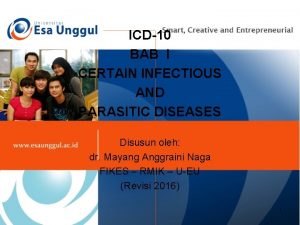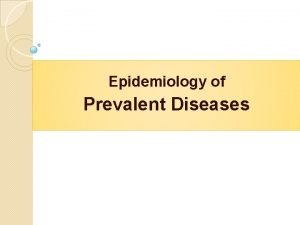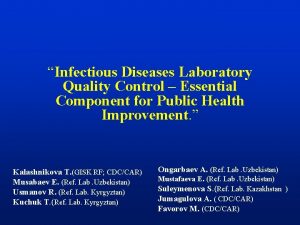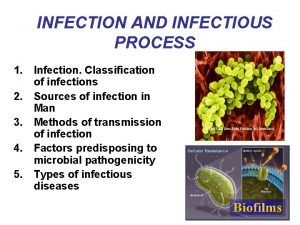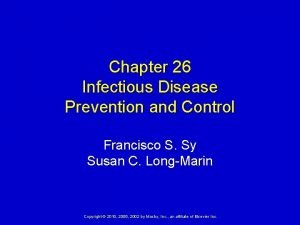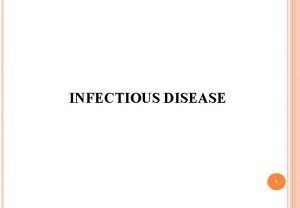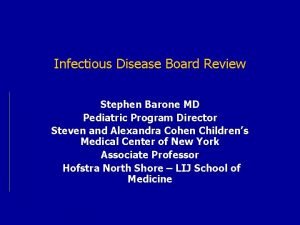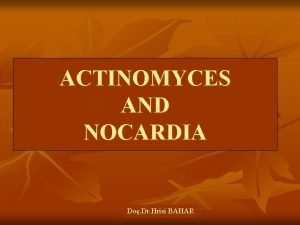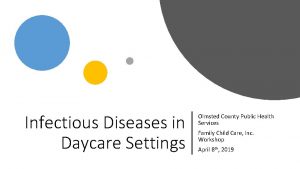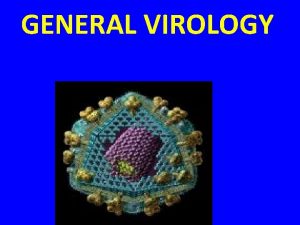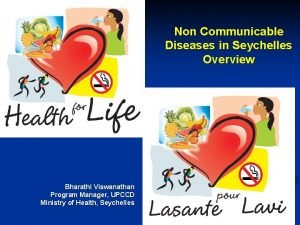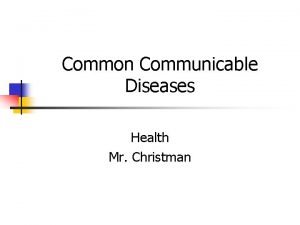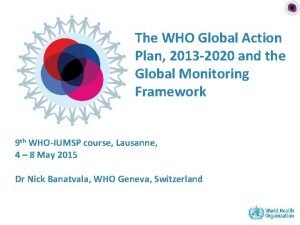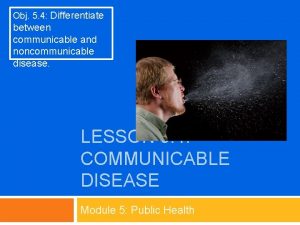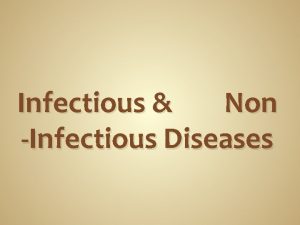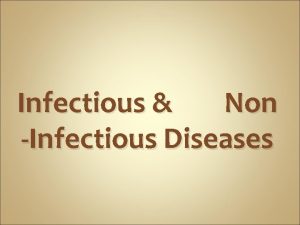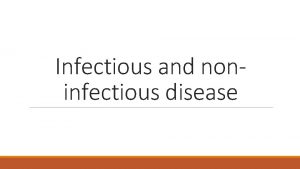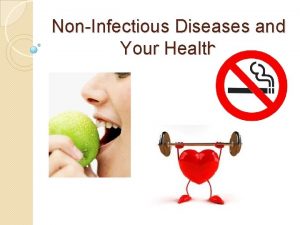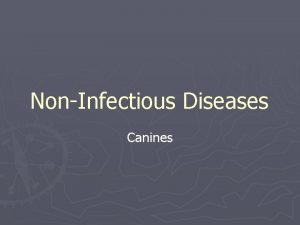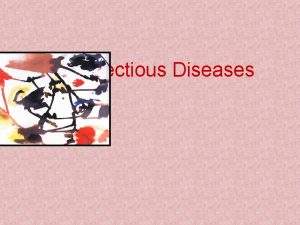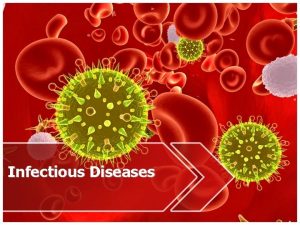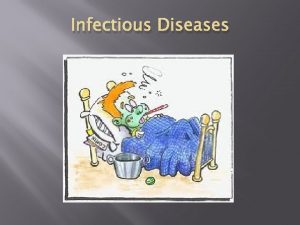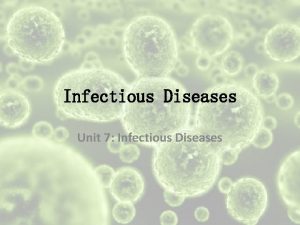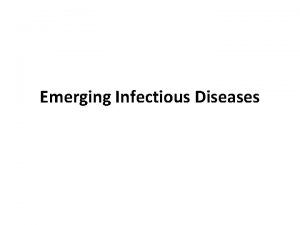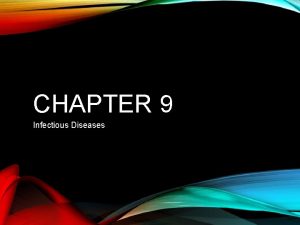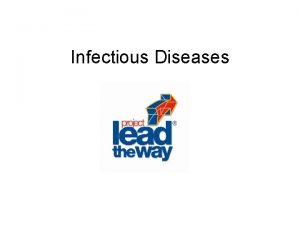Diseases Non Infectious Infectious Disease NonInfectious Disease Disease















- Slides: 15

Diseases Non Infectious & Infectious Disease

Non-Infectious Disease § Disease NOT caused by contact with person, object, animal or substance § NOT contagious § Caused by RISK FACTORS – behavioral, environmental, hereditary § Examples: cancer, diabetes, heart disease, stroke, high blood pressure

Infectious Disease § Caused by micro-organisms that enter, live in, and multiply within the human body. § Examples: Mono, Rabies, Chicken Pox, Measles, Colds, Flu

The Spread of Infectious Diseases People come in contact with pathogens through: 1. Contact with an infected person: directly or indirectly – hugs, kisses, touching, sneezes, coughing sneeze – an expulsion of air from the nose and mouth. This air can reach speeds of 70 mph and an unimpeded sneeze sends two to five thousand bacteria-filled droplets into the air.

The Sneeze: How Germs are Spread – You. Tube § You. Tube - Coughing Robot Spews 'Flu Germs‘ § You. Tube - The Story behind the Sleeve § The Sneeze – You. Tube (opera music)

People come in contact with pathogens through: 2. Contact with a contaminated object: some can survive for a period of time outside a person’s body – door knobs, cups, pens Some viruses and bacteria can live from 20 minutes up to 2 hours or more on surfaces like cafeteria tables, doorknobs, and desks. (Ansari, 1988; Scott and Bloomfield, 1989)

People come in contact with pathogens through: 3. Contact with an infected animal: some disease can be spread by animals – rabies, malaria

The Four Ways Infectious Diseases Enter The Body 1. Air we breathe 2. Swallowing 3. Breaks in the Skin 4. Moist linings of eyes, ears, nose, mouth

Preventing Infectious Disease 1. AVOID contact with pathogens 2. GET IMMUNIZED with a vaccine shot 3. CHOOSE healthy behaviors – get sleep, eat healthy, DON’T SHARE items, WASH HANDS!!!!!

Pathogens are Micro-Organisms that cause disease: VIRUS: the smallest pathogen - 100 x smaller than bacteria - can multiply only by entering into a living cell - different types of viruses enter different types of cells - cannot just “get rid of it”

Pathogens are Micro-Organisms that cause disease: BACTERIA – single celled microorganisms that can live almost ANYWHERE!! - air, soil, food, plants, animals, objects, on HUMANS!! * Antibiotics can fight against bacteria

What do you have to remember when washing your hands? ? ? § HANDWASHING is the #1 way to prevent the spread of infectious disease!!! § 40% of food borne illness is the result of poor handwashing

What do you have to remember when washing your hands? ? ? § Germs are STICKY – use soap and water § 20 -30 seconds or as long as it takes to sing Happy Birthday 2 x § Warm water makes more bubbles to lift germs away

What do you have to remember when washing your hands? ? ? § Wash your hands – before eating, before preparing food, after going to the bathroom, changing diapers, touching animals, shaking hands, taking out the trash, after smoking, working, playing, § Use paper towels to turn off faucets and open doors to prevent re-contamination

Some links… § You. Tube - Bill Nye - Anti-Bacterial Soap versus Regular Water § You. Tube - Cell Phone Bacteria WARNING! Dirty Purses: All ladies must see this video about your purse and bacteria! - You. Tube
 Certain infectious and parasitic diseases
Certain infectious and parasitic diseases Emerging infectious diseases
Emerging infectious diseases Infectious disease quality controls
Infectious disease quality controls Stages of infection
Stages of infection Chapter 26 infectious disease prevention and control
Chapter 26 infectious disease prevention and control Stages of infectious disease
Stages of infectious disease Infectious disease board review
Infectious disease board review Infectious disease
Infectious disease Hennepin county infectious disease manual
Hennepin county infectious disease manual What is the smallest infectious disease agent
What is the smallest infectious disease agent Communicable disease and non communicable disease
Communicable disease and non communicable disease Non communicable diseases
Non communicable diseases Non common communicable diseases
Non common communicable diseases Non communicable diseases infographic
Non communicable diseases infographic Venn diagram of communicable and non-communicable diseases
Venn diagram of communicable and non-communicable diseases Venn diagram of communicable and non-communicable diseases
Venn diagram of communicable and non-communicable diseases
